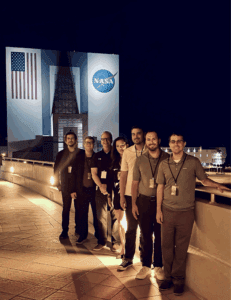Projects demonstrate revolutionary information management technology and sustainable nutrition for future space missions.

Left: Marcello Caporicci, Andrew Wiley (from Voyager Technologies), Chris Barnett, Mile Corrigan, Brad Abramson, Andrew Biviano, Nicholas Tolli (from Noblis)
RESTON, Va. — Aug. 25, 2025 — Noblis, Inc., a leading provider of science, technology and strategy services to the federal government, today announced the successful launch and arrival of two innovative research initiatives to the International Space Station (ISS): the Helix Horizons Astral DNA Storage Endeavor, a DNA-based data encoding and storage system, and the Synthetic consortia Integrated Production System (ScIPS), a space-based biomanufacturing and autonomous life-support system.
These experimental payloads were made available by Voyager Technologies, with sponsorship from the ISS National Laboratory, and delivered via SpaceX’s Dragon spacecraft as part of ongoing research to revolutionize both data storage capabilities and sustainable nutrition for space missions.
“By launching experiments in molecular DNA data storage and synthetic biology platforms in space, we are not only testing system performance in extreme environments, we’re validating architectures that could one day enable massive scalability with ultra-stable data archives and adaptive biomanufacturing for deep space missions.” said Mile Corrigan, president and CEO of Noblis. “The ability to store humanity’s most critical data in DNA and manufacture essential materials in space isn’t just a scientific milestone – it can accelerate new markets in data infrastructure, space-based manufacturing and autonomous life-support systems.”
Helix Horizons addresses critical challenges in space-based data storage, including power requirements, radiation resilience, mass constraints and secure information retention. The experiment consists of four payloads containing encrypted DNA messages and microbial cultures that will be analyzed by astronauts using the space station’s genomic sequencer.
“With Helix Horizons, we’re taking technologies in new directions that anticipate customer needs,” said Andrew Biviano, the project’s principal investigator. “This experiment is the culmination of years of R&D, with cutting-edge use cases ranging from secure communication to long-term data archiving, applicable across the aerospace, defense and intelligence sectors.”
Simultaneously, the ScIPS project tackles the challenge of maintaining sustainable nutrition resources in remote or hostile environments. By developing synthetic communities of Generally Recognized as Safe (GRAS) microorganisms that can be grown where they are consumed, and with each type of organism providing an essential human nutritional component, ScIPS represents a new paradigm for biomanufacturing in remote, austere conditions.
“The ScIPS platform represents an innovative approach to critical challenges in both space and here on Earth,” said Dr. Bradley Abramson, principal investigator for the ScIPS project. “The microorganisms we’re deploying can drive sustainable nutrition systems in space stations or humanitarian crisis zones as autonomous life-support systems. The same versatile technology can be applied to develop biofuels and biomaterials at the point of need.”
Following today’s successful arrival to the space station, the experiments will progress through several key milestones, including DNA sequencing supported by astronauts, transmission of sequenced data back to Earth and analysis and decryption of the data by Noblis researchers.